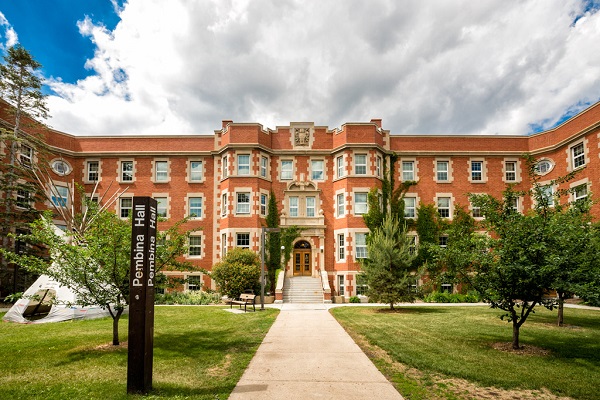University of Alberta: Research into how we retrieve memories could help treat people with PTSD and other anxiety disorders
Altering traumatic memories in a way that eases their burden could be the key to treating survivors of post-traumatic stress disorder and other anxiety disorders, according to one of the University of Alberta’s newest Canada Research Chairs (CRC).
Peggy St. Jacques, psychology researcher in the Faculty of Science and CRC in Cognitive Neuroscience of Memory, said her research revolves around why our perspectives can change during memory retrieval.
“One way to think about that is if you think of a memory from your childhood, often you actually see yourself in the events, like you’re looking at a photograph of yourself,” explained St. Jacques, who is also a member of the U of A’s Neuroscience and Mental Health Institute.
This shift from an own-view perspective, which was how the memory was forged, to an observer perspective has been reported more frequently in people who suffer from PTSD. According to St. Jacques, understanding how this kind of out-of-body observer imagery affects memories could help to make these memories less disturbing.
With this in mind, her past research has focused on whether the manipulation of perspective leads to changes not only in the accuracy of memories but also changes in subjective aspects, such as how vividly someone can recall an event and the emotions associated with it.
Shifting perspectives
In a recent study, St. Jacques and her team asked participants to retrieve recent memories naturally associated with seeing it through their own eyes.
The participants were later brought back into the lab and their brains were imaged while they either retrieved those memories with an own-eyes perspective, as they saw it the first time around, or retrieved them by shifting their viewpoint to an observer perspective.
The researchers found a reduction in emotional intensity when participants shifted from an own-eyes perspective to an observer perspective. They also found that this change in perspective altered the brain regions associated with remembering.
“We’re really interested in how shifting perspective during retrieval can actually modify and update memories,” said St. Jacques.
“Our memories are really important to our sense of self, but often in a lot of mental impairments like PTSD or social anxiety, there can be changes in the viewpoints of people’s memories.”
She said the focus of this CRC appointment is to give her the time and resources to delve into the missing piece of the puzzle, which is understanding how our viewpoint affects how we form memories.
“Although we typically experience the world through our own eyes, negative events like the pandemic, for instance, make it apparent that we do often see ourselves in those events and that’s how we are potentially forming memories.”
St. Jacques added that the CRC funding means so much more than just the ability to further her research program.
“As an Indigenous woman in science, receiving the CRC also means being a leader in the field and the responsibilities that go with that, such as supporting equity, diversity and inclusivity in science.”
Supporting big ideas
St. Jacques’s CRC was announced alongside a slate of federal grants including six U of A CRCs worth a total of $5.9 million.
Vladimir Michaelis was named as a new CRC in Magnetic Resonance of Advanced Materials. His research involves using massive magnets to understand the atomic-level structure and dynamics of new materials to help Canada’s technology sector evolve and diversify the global energy economy.
CRC renewals included two Faculty of Medicine & Dentistry researchers—biochemist Mark Glover (Structural Molecular Biology) and surgery professor James Shapiro (Transplantation Surgery and Regenerative Medicine)—as well as Faculty of Engineering professors Joao Soares (Advanced Polymer Reaction) and Peichun Amy Tsai (Fluids and Interfaces).
Additionally, the Government of Canada announced the results of the Social Sciences and Humanities Research Council (SSHRC) Partnership Development Grant program. Winning projects included:
Sherry Dahlke (Faculty of Nursing), Awakening Canadians to agism, $199,200
Samira Elatia (Campus Saint-Jean), Educational leadership and administration at the intersections of gender, $197,183
Sandra Hodgetts (Faculty of Rehabilitation Medicine), Amplifying autistic “voices”: Learning from and with autistic adults to enhance self-determination, $156,441
Gordon Gow (Faculty of Arts), The Technology Stewardship Project: Engendering inclusivity for digital agriculture innovation in the Global South, $194,140
Christina Rinaldi (Faculty of Education), Mentoring Relationships: Exploring connections, relatedness and well-being of both mentors and youth mentees, $198,009
As well, 28 SSHRC Insight Grants totalling $4.4 million and 28 SSHRC Insight Development Grants worth $1.5 million were announced for the U of A.
Established in 2000, the Canada Research Chairs program is part of a national strategy to make Canada one of the world’s top countries in research and development. Chairholders aim to achieve research excellence in engineering and the natural sciences, health sciences, humanities and social sciences.

